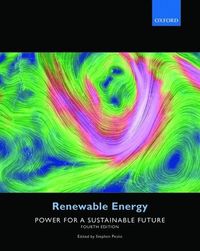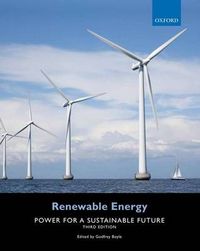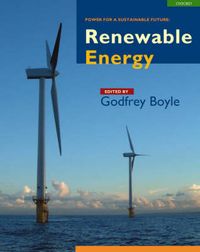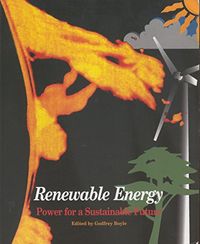
endast ny
Renewable Energy Upplaga 4
The provision of sustainable energy supplies for an expanding and increasingly productive world is one of the major issues facing civilisation today. Renewable Energy examines both the practical and economic potential of the renewable energy sources to meet this challenge. The underlying physical and technological principles behind deriving power from direct solar (solar thermal and photovoltaics), indirect solar (biomass, hydro, wind and wave) and non-solar (tidal and geothermal) energy sources are explained, within the context of their environmental impacts, their economics and their future prospects. Renewable Energy provides both perspective and detail on the relative merits and state of progress of technologies for utilizing the various 'renewables'. The analysis considers emissions, sustainability, cost implications and energy security, as political and economic pressures move society towards a low-carbon future. From an overview of basic energy conversion processes, through a discussion of the individual renewable sources, to a concluding examination of the prospects for their integration into national and international networks and the outlook for renewable energy, this book provides a valuable insight into prospects for the renewables. Online resources Renewable Energy is accompanied by online resources which include: For students: · Auto- marked multiple choice questions to accompany each chapter · Curated links to further information and up-to-date energy statistics. For registered adopters of the book: · Figures from the book: available to download for use in lectures
Upplaga: 4e upplagan
Utgiven: 2018
ISBN: 9780198759751
Förlag: OUP Oxford
Format: Häftad
Språk: Engelska
Sidor: 680 st
4 upplagor

Upplaga 3 (2012)
från 179 kr
Upplaga 2 (2004)
från 119 kr
Upplaga 1 (1996)
957 kr (endast ny)
Upplaga 4 (2018)
895 kr (endast ny)The provision of sustainable energy supplies for an expanding and increasingly productive world is one of the major issues facing civilisation today. Renewable Energy examines both the practical and economic potential of the renewable energy sources to meet this challenge. The underlying physical and technological principles behind deriving power from direct solar (solar thermal and photovoltaics), indirect solar (biomass, hydro, wind and wave) and non-solar (tidal and geothermal) energy sources are explained, within the context of their environmental impacts, their economics and their future prospects. Renewable Energy provides both perspective and detail on the relative merits and state of progress of technologies for utilizing the various 'renewables'. The analysis considers emissions, sustainability, cost implications and energy security, as political and economic pressures move society towards a low-carbon future. From an overview of basic energy conversion processes, through a discussion of the individual renewable sources, to a concluding examination of the prospects for their integration into national and international networks and the outlook for renewable energy, this book provides a valuable insight into prospects for the renewables. Online resources Renewable Energy is accompanied by online resources which include: For students: · Auto- marked multiple choice questions to accompany each chapter · Curated links to further information and up-to-date energy statistics. For registered adopters of the book: · Figures from the book: available to download for use in lectures
Ny bok
851 kr895 kr
5% studentrabatt med Studentapan
Begagnad bok (0 st)
Varje vecka tillkommer tusentals nya säljare. Bevaka boken så får du meddelande när den finns tillgänglig igen.



